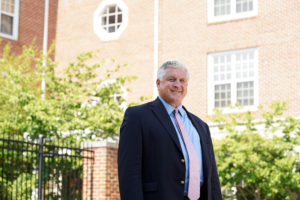Brian Baker ’84 grew up taking Boardwalk, and all the top spots, in epic family Monopoly competitions.

As head of UMW’s Small Business Development Center, Brian Baker helps entrepreneurs bring their businesses to fruition and contributes to the economic wellbeing of the Fredericksburg region. Photo by Suzanne Carr Rossi.
His work at UMW calls for that same business savvy, but it’s no board game. As Small Business Development Center (SBDC) executive director, Baker helps local entrepreneurs make their ideas – and the local economy – flourish.
His most recent Boardwalk? The Prince Woodard Leadership Award he received last weekend from the Fredericksburg Regional Chamber of Commerce for his lifetime commitment to the area’s fiscal development.
In the nearly two decades Baker has been at its helm, SBDC has risen in stature among similar centers, ranking in Virginia’s top five. He and his team are credited with engaging thousands of small businesses and launching more than 550, while creating or retaining nearly 8,000 jobs.
His involvement in sports – from football to field hockey – has added to Baker’s competitive spirit, and that, he said, is what business is largely about. As a Mary Washington student, he earned bachelor’s and MBA degrees, and learned about finance and economics from the likes of professors Steve Greenlaw and Robert Rycroft.
“They only thought I was asleep during lectures,” said Baker, who also met his wife, former UMW Assistant VP for Business Services Erma Ames Baker ’82, in college and went on to own his own business for decades.
When he decided to sell, he planned to take a year off, recharge and work on the house. But another Mary Washington opportunity knocked, and he joined the SBDC. That was 19 years ago.
“The work on the house is waiting on me.”
Q: What’s most rewarding about your job?
A: I get to work with brilliant, hard-working people – clients, community stakeholders, students and faculty – in diverse and dynamic ways. I call them “builders.” They create investment opportunities and jobs. They’re amazing.
Q: What’s most challenging?
A: What’s this thing they call sleep? I’d like some of that.
Q: What are three qualities needed for successful business?
A: 1. Get over yourself and learn to be a good listener. It’s easy to be impressed by your own ideas, but if no one wants to buy them, what good are they? 2. Welcome failure. Failure is memorable; it helps refine how we manage risk. Thomas Edison said, “I have not failed. I found 10,000 ways that will not work.” 3. Do it. Progression is more valuable in business than perfection.
Q: You taught a recent experiential entrepreneurship course for the College of Business. Would you do it again?
A: Without hesitation. The class was a startup itself. The students were bright, engaged and hardworking. They presented their concepts to a panel of judges and generated business plans that demonstrated market potential and a strategy for making money. There were many champions in that class.
Q: What’s something people would be surprised to learn about you?
A: I went hang gliding in the dunes at Kill Devil Hills with my daughter. It did not end well.
Q: Any mottos?
A: Live to eat … never trust a skinny chef.